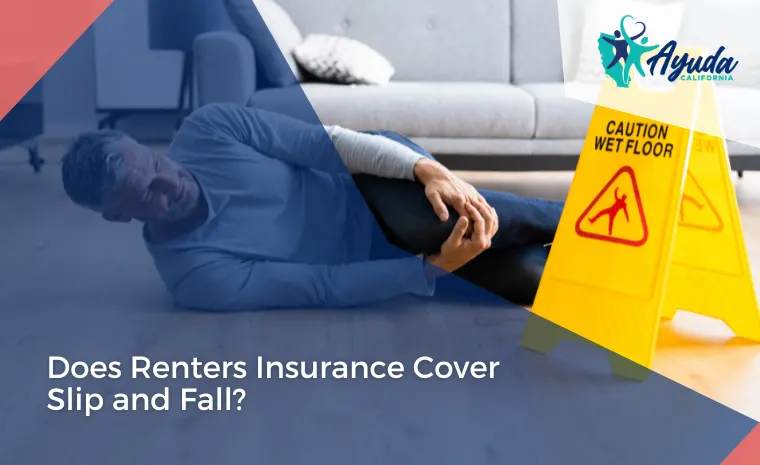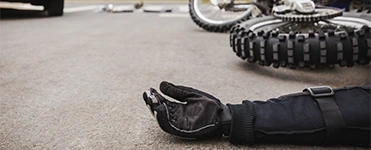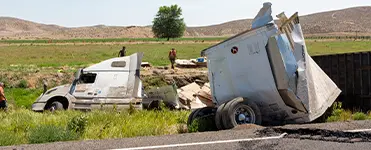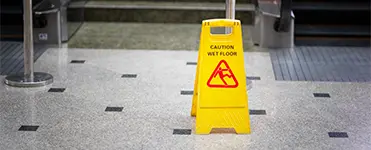Does Renters Insurance Cover Slip and Fall?
Renters insurance is a crucial financial protection for tenants in California, safeguarding them against various risks, including slip-and-fall incidents. It can also cover property damage and loss of use coverage.
This article will focus on California’s renters insurance regulations and how they relate to slip-and-fall accidents. We will also look into the laws that protect renters and the scenarios where an injured party may be eligible to file claims for a slip-and-fall accident under a renters insurance coverage.
Injured due to a slip-and-fall accident in a rented property?
Laws that Protect Renters in California
California law does not mandate personal injury renters insurance. However, landlords may request tenants to obtain renters insurance as part of the lease agreement, which is aimed at protecting both parties’ interests in case of unforeseen events, such as accidents or damage to personal property.
California Civil Code Section 1952 prohibits unauthorized stay or forceful entry on a property. If a landlord takes someone to court under the unauthorized stay or forceful entry rules, they can still separately take them to court for other issues.
California Civil Code Section 1941.1 states that landlords are legally responsible for ensuring that the units where tenants live are safe and in good condition, which is called “habitability.” This involves things like making sure plumbing, heating, electrical systems, floors, and stairs work properly and are safe, providing waterproofing, having windows and doors with functioning locks, and keeping the property free from pests like roaches and rats.
Even if tenants knew that their unit wasn’t up to these standards when they moved in, it’s still the landlord’s job to make sure all units are habitable. Additionally the Office of the Attorney General in California highlights that:
- If tenants have health or safety problems in their homes, they have the right to ask their landlords to fix things. It’s a good idea to make these requests in writing, and tenants should keep records of these requests through messages, emails, letters, and even videos and photos. Keeping copies of these communications is important.
- If a landlord refuses to make necessary repairs, tenants can get in touch with their local code enforcement office or health department. Some cities or counties might also have a rent board or program that deals with building safety and health.
- Tenants also have a duty to keep their units clean and hygienic, use appliances correctly, and avoid damaging the unit. If they do cause damage, they need to fix it.
Lastly, California Civil Code Sections 1942.3 states that if a tenant is given an eviction notice and their unit isn’t safe or healthy to live in, they should tell a lawyer or the court about the problems. This information could help the tenant’s case or impact the landlord’s right to evict them.
Injured due to a slip-and-fall accident in a property you rented?
Coverage for Slip-and-Fall Incidents
Renters insurance typically includes personal liability coverage, which can extend to slip-and-fall incidents that occur on your rented property. If you are a guest or visitor and you accidentally slip and got injured in a rental unit, compensation from a renters insurance might help cover medical treatment costs and legal fees.
Coverage includes:
- Guest Injury: Let’s say you visit your friend’s apartment and slip on a wet floor, injuring yourself. A renter’s insurance would cover their medical expenses up to the policy’s liability limit. However, if negligence caused the slippery surface, the insurance company might investigate the circumstances.
- Injury Outside the Rental Property: If you slip and fall in a common area of an apartment complex, such as the lobby or walkway, a renters insurance could still provide coverage. However, if the property management company’s negligence caused the accident (e.g., failure to maintain the walkway), their liability insurance might be primary.
- Exclusions: Renters insurance typically doesn’t cover injuries to the primary renters or their family members living with them. Additionally, intentional acts or bodily injuries resulting from certain high-risk activities might not be covered.
A personal liability insurance, particularly the one specifically for renters, can assist in covering the legal expenses and the medical costs of the injured person. Renters may only be required to pay the insurance deductible and any sum that surpasses their renters policy limits.

Understanding Policy Details
Policy details, limits, deductibles, and exclusions can vary. Moreover, every category of coverage outlined in a renters insurance policy comes with a specific limit, which represents the maximum payout for a given claim type. For many situations, the typical liability coverage limit in renters insurance is set at $100,000, which may vary depending on the insurance premium chosen.
While some slip-and-fall incidents might be covered, others might not meet the criteria outlined in the policy. Consulting with a local accident lawyer can help you understand the rights you have and the possible damages, plus gather the evidence you need to help you file to get fair compensation.
Consult a Slip and Fall Lawyer
Does renters insurance cover slip and fall? Yes. Renters insurance in California offers valuable liability protection, including coverage for slip-and-fall incidents for guests or visitors, but might exclude coverage for the tenants. Therefore, understanding the specific regulations, coverage nuances, and insurance policy details is essential.
Take the time to consult with a slip-and-fall lawyer who can help you know your rights if you are injured in a slip-and-fall accident within a rented property.
At Ayuda California, we are dedicated to fighting for your rights. Our dedicated legal team, medical experts, and case managers are committed to helping accident victims recover the compensation they need and deserve. We work on a contingency fee basis and offer our clients a No Fee Guarantee, this means you won’t need to pay us a single cent unless we win your case.
Contact us at (844) 865-0721 for a free case consultation. We Speak English, Spanish, and Filipino. We are available 24/7!




















